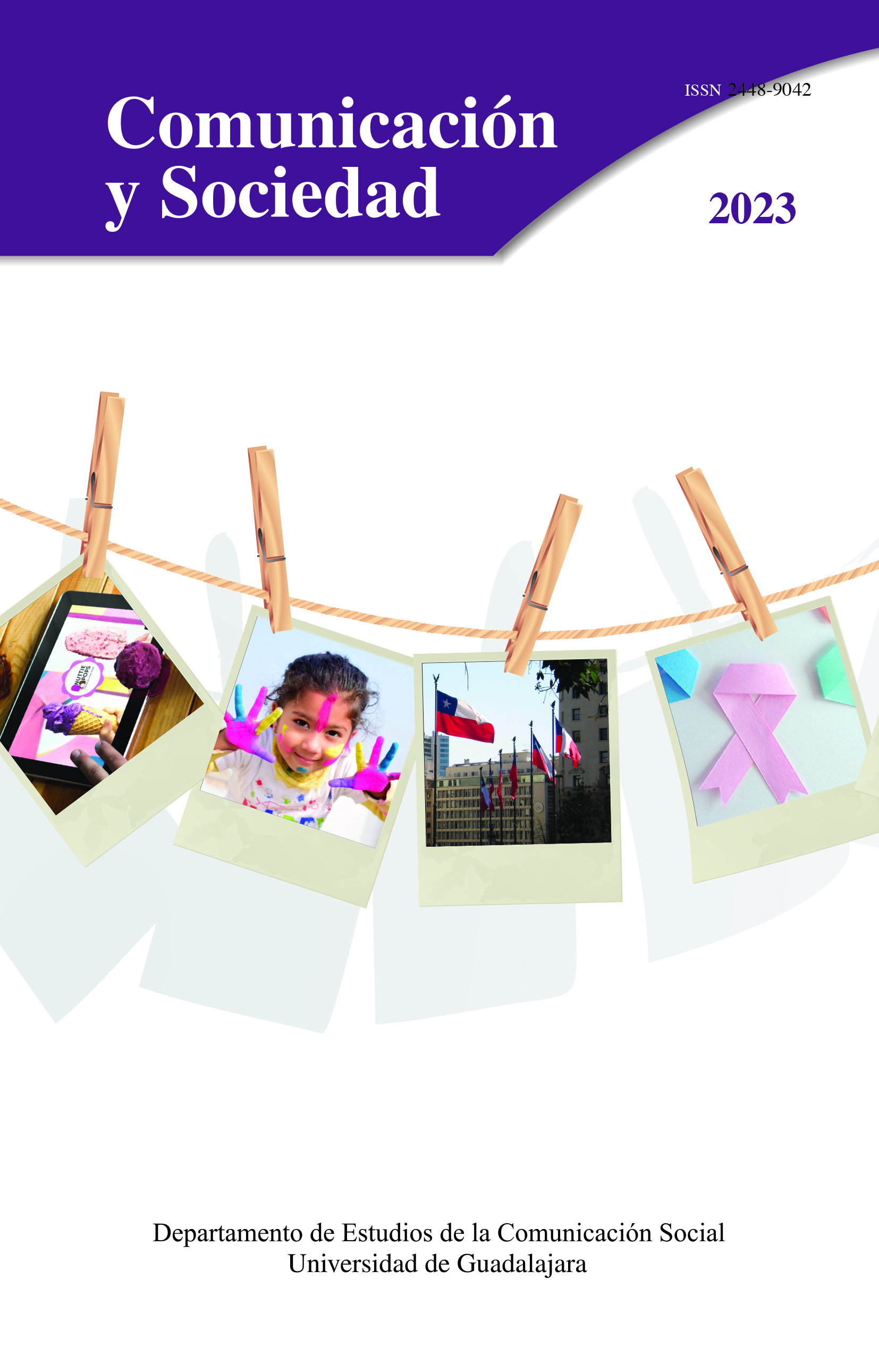Tuits sobre la población migrante durante las elecciones políticas de la Comunidad de Madrid
DOI:
https://doi.org/10.32870/cys.v2023.8418Palabras clave:
Twitter, Análisis del discurso, Inmigración, Campañas electoralesResumen
En este artículo presentamos la investigación realizada sobre el uso de narrativas migratorias y si hubo discursos de odio por los partidos políticos hacia la población migrante en Twitter en las campañas electorales de la Comunidad de Madrid en 2019 y 2021. Mediante un análisis crítico del discurso, los resultados confirman que se ha producido un incremento exponencial por parte de todos los partidos para hablar de inmigración. Los discursos de odio hacia los menores no acompañados y los migrantes en situación irregular promovidos por el partido Vox han marcado la agenda setting para hablar de inmigración.Descargas
Citas
Alberdi, C. (2019). Anti-immigration discourse on twitter: Discourse on others and hate speech. Caietele Echinox, 36, 133-150. https://doi.org/10.24193/cechinox.2019.36.11
Alcántara-Plá, M., Ruiz-Sánchez, A. (2018). Not for Twitter: Migration as a Silenced Topic in the 2015 Spanish General Election. En M. Schröter & C. Taylor (Eds.), Exploring Silence and Absence in Discourse. Postdisciplinary Studies in Discourse (pp. 25-64). Palgrave Macmillan. https://doi.org/10.1007/978-3-319-64580-3_2
Anderson, S. E., DeLeo, R. A. & Taylor, K. (2020). Policy entrepreneurs, legislators, and agenda setting: information and influence. Policy Studies Journal, 48(3), 587-611. https://doi.org/10.1111/psj.12331
Arcila Calderón, C., Blanco-Herrero, D. & Valdez, M. B. (2020). Rejection and Hate Speech in Twitter: Content Analysis of Tweets about Migrants and Refugees in Spanish. Revista Española de Investigaciones Sociológicas, 172, 24-40. https://doi.org/10.5477/cis/reis.172.21
Bauman, Z. (2002). Modernidad líquida. Fondo de Cultura Económica de España.
Boomgaarden, H. & Vliegenthart, R. (2007). Explaining the Rise of Anti-Immigrant Parties: The Role of News Media Content in the Netherlands. Electoral Studies, 26(2), 404-417. https://doi.org/10.1016/j.electstud.2006.10.018
Casals, X. (2009). La Plataforma per-Catalunya: la eclosión de un nacional-populismo catalán (2003-2009). Working Papers, 274, 1-33. https://www.icps.cat/archivos/WorkingPapers/wp274.pdf?noga=1
Castro, P. & Mo Groba, D. (2020). El issue de la inmigración en los votantes de VOX en las Elecciones Generales de noviembre de 2019. Revista de Investigaciones Políticas y Sociológicas, 19(1), 39-58. https://doi.org/10.15304/rips.19.1.6947
Centro de Investigaciones Sociológicas-CIS. (2006). Barómetro de julio 2006. Número 2651. https://analisis.cis.es/cisdb.jsp?ESTUDIO=2651
Centro de Investigaciones Sociológicas-CIS. (2011). Barómetro de marzo 2011. Número 2864. https://analisis.cis.es/cisdb.jsp?ESTUDIO=2864
Centro de Investigaciones Sociológicas-CIS. (2018). Barómetro de la vivienda y el alquiler. Número 3212. https://analisis.cis.es/cisdb.jsp?ESTUDIO=3212
Centro de Investigaciones Sociológicas-CIS. (2019). Macrobarómetro de abril 2019. preelectoral elecciones al parlamento europeo, autonómicas y municipales 2019. Número 3245. https://www.cis.es/cis/opencm/ES/1_encuestas/estudios/listaMuestras.jsp?estudio=14449
Comisión Europea. (2019). How the Code of Conduct helped countering illegal hate speech online. https://ec.europa.eu/info/sites/info/files/hatespeech_infographic3_web.pdf
Consejo de Europa. (1997). Recomendación nº R (97) 20: “Discurso de odio”. Comité de Ministros.
DellaPosta, D. (2020). Pluralistic Collapse: The “Oil Spill” Model of Mass Opinion Polarization. American Sociological Review, 85(3), 507-536. https://doi.org/10.1177/0003122420922989
Dunaway, J., Branton, R. & Abrajano, M. (2010). Agenda Setting, Public Opinon, and the Issue of Immigration Reform. Social Sciences Quarterly, 91(2), 359-378. https://doi.org/10.1111/j.1540-6237.2010.00697.x
Eatwell, R. (2000). The Rebirth of the “Extreme Right” in Western Europe. Parliamentary Affairs, 53(3), 407-425. https://doi.org/10.1093/pa/53.3.407
Ekman, M. (2019). Anti-immigration and racist discourse in social media. European Journal of Communication, 34(6), 606-618. https://doi.org/10.1177/0267323119886151
Engl, A. & Evrard, E. (2020). Agenda-setting dynamics in the post-2020 cohesion policy reform: the pathway towards the European cross-border mechanism as possible policy change. Journal of European Integration, 42(7), 917-935. https://doi.org/10.1080/07036337.2019.1689969
Fernández Suárez, B. (2021). Gender and Immigration in VOX: The Discourse of the Radical Right in Spain. Migraciones. Publicación del Instituto universitario de Estudios sobre Migraciones, (51), 241-268. https://doi.org/10.14422/mig.i51y2021.009
Ferreira, C. (2019). Vox como representante de la derecha radical en España: un estudio sobre su ideología. Revista Española de Ciencia Política, 51, 73-98. https://doi.org/10.21308/recp.51.03
Girard, R. (1986). El chivo expiatorio. Anagrama.
Golder, M. (2003). Explaining Variation in the Success of Extreme Right Parties in Western Europe. Comparative Political Studies, 36(4), 432-466. https://doi.org/10.1177/0010414003251176
Hainsworth, P. (2008). The Extreme Right in Western Europe. Routledge.
Han, B. C. (2017). La sociedad del cansancio. Herder.
Hansworth, P. (2016). Politics of the Extreme Right. From the Margins to the Mainstream. Bloomsbury Publishing.
Huntington, S. (1996). The Clash of Civilizations and the Remaking of World Order. Simon & Schuster.
Instituto Nacional de Estadística-INE. (2021). Población extranjera por Nacionalidad, provincias, Sexo y Año. https://www.ine.es/jaxi/Datos.htm?path=/t20/e245/p08/l0/&file=03005.px
Jaramillo-Dent, D., Contreras-Pulido, P. & Pérez-Rodríguez, M. A. (2021). Right-wing immigration narratives in Spain: A study of persuasion on Instagram Stories. European Journal of Communication, 37(2), 161-180. https://doi.org/10.1177/02673231211012157
Kreis, R. (2017). #refugeesnotwelcome: Anti-refugee discourse on Twitter. Discourse & Communication, 11, 498-514. https://doi.org/10.1177/1750481317714121
Leader-Maynard, J. & Benesch, S. (2016). Dangerous speech and dangerous ideology: An integrated model for monitoring and prevention. Genocide Studies and Prevention: An International Journal, 9(3), 70-95. http://dx.doi.org/10.5038/1911-9933.9.3.1317
Leurs, K., Agirreazkuenaga, I., Smets, K. & Mevsimler, M. (2020). The politics and poetics of migrant narratives. European Journal of Cultural Studies, 23(5), 679-697. https://doi.org/10.1177/1367549419896367
Levi, E., Dasi, R. & Patriarca, F. (2019). Hate at first sight? Dynamic aspects of the electoral impact of migration: the case of Ukip. Journal of Population Economics, 33, 1-32. https://doi.org/10.1007/s00148-019-00746-5
Levinas, E. (2015). Ética e infinito. Antonio Machado Libros.
Llorent-Bedmar, V. (2012). The educational role of the digital media in the integration of immigrants in Spain: El mundo.es and El pais.com. Comunicar, 38, 139-146. https://doi.org/10.3916/C38-2012-03-05
Luri, G. (2021). La mermelada sentimental. Encuentro.
Martín-Barbero, J. (2008). The explosion of narratives and the multiplication of readings. [Estallido de los relatos y pluralización de las lecturas]. Comunicar, 30, 15-20. https://doi.org/10.3916/c30-2008-01-002
Mendez, I. & Cutillas, I. (2014). Has immigration affected Spanish presidential elections results? Journal of Population Economics, 27, 135-171. https://doi.org/10.1007/s00148-013-0471-y
Miller, H. V., Ripepi, M., Ernstes, A. M. & Peguero, A. (2020). Immigration Policy and Justice in the Era of COVID-19. American Journal of Criminal Justice, 45, 793-809. https://doi.org/10.1007/s12103-020-09544-2
Mols, F. & Jetten, J. (2016). Explaining the Appeal of Populist Right-Wing Parties in Times of Economic Prosperity. Political Psychology, 32(2), 275-292. https://doi.org/10.1111/pops.12258
Mudde, C. (2017). The Populist Radical Right. Routdledge.
Müller, K. & Schwarz, C. (2017). Fanning the Flames of Hate: Social Media and Hate Crime. SSRN Electronic Journal. http://dx.doi.org/10.2139/ssrn.3082972
Müller, K. & Schwarz, C. (2020). From Hashtag to Hate Crime: Twitter and Anti-Minority Sentiment. SSRN Electronic Journal. http://dx.doi.org/10.2139/ssrn.3149103
Nygaard, S. (2020). Boundary Work: Intermedia Agenda-Setting Between Right-Wing Alternative Media and Professional Journalism. Journalism Studies, 21(6), 766-782.https://doi.org/10.1080/1461670X.2020.1722731
Organización de las Naciones Unidas-ONU. (2006). Trends in Total Migrant Stock: The 2005 Revision. Population Division of the Department of Economic and Social Affairs.
Organización Internacional de Migraciones-OIM. (2021). Informe anual 2021. https://www.iom.int/es/informes-anuales-y-resultados-de-la-oim-2021
Park, J. (2015). Europe’s migration crisis. Council on Foreign Relations. https://bit.ly/2EiOGNA
Paul, J. (2021). “Because for us, as Europeans, it is only normal again when we are great again”: metapolitical whiteness and the normalization of white supremacist discourse in the wake of Trump. Ethnic and Racial Studies, 44(13), 2328-2349. https://doi.org/10.1080/01419870.2021.1922730
Pettigrew, R. (2021). Radical epistemology, structural explanations, and epistemic weaponry. Philosophical Studies, 179, 289-304. https://doi.org/10.1007/s11098-021-01660-x
Popper, K. (2017). La sociedad abierta y sus enemigos. Paidós.
Prieto-Andrés, A. & Fernández-Romero, C. (2020). Medios de comunicación y esfera pública: el caso del tratamiento por la prensa española de las políticas públicas en torno a la ley de extranjería. Política y Sociedad, 57(1), 121-141. https://doi.org/10.5209/poso.62921
Rinken, S. (2019). Actitudes ante la inmigración y comportamiento electoral en España. Anuario CIDOB de la Inmigración 2019, 68-81. https://doi.org/10.24241/AnuarioCIDOBInmi.2019.6
Ruiz-Echeondo, A., Medina-Moles, M. & García-Molinero, L. (2001). ¿Fomenta la prensa onubense la integración de los inmigrantes en nuestra ciudad? Comunicar, 17, 176-179. https://doi.org/10.3916/C17-2001-28
Veeramoothoo, S. (2020). Social Justice and the Portrayal of Migrants in International Organization for Migration’s World Migration Reports. Journal of Technical Writing and Communication, 52(1), 57-93. https://doi.org/10.1177/0047281620953377
Velasco, V. & Rodríguez-Alarcón, L. (2019). Nuevas narrativas migratorias para reemplazar el discurso del odio. Por Causa.
Zapata-Barrero, R. (2009). Fundamentos de los discursos políticos en torno a la inmigración. Trotta.
Zúquete, J. P. (2017). The European Extreme-Right and Islam: New Directions? En C. Mudde (Ed.), The Populist Radical Right. A Reader (pp. 103-123). Routledge.
Descargas
Publicado
Cómo citar
Número
Sección
Licencia

Esta obra está bajo una licencia internacional Creative Commons Atribución-NoComercial 4.0.
Los autores/as que publiquen en esta revista aceptan las siguientes condiciones:
De acuerdo con la legislación de derechos de autor, los autores conservan los derechos de autoría y otorgan a Comunicación y Sociedad el derecho de primera comunicación pública de la obra. Comunicación y Sociedad no realiza cargos a los autores por enviar y procesar artículos para su publicación.
Los autores/as pueden realizar otros acuerdos contractuales independientes y adicionales para la distribución no exclusiva de la versión del artículo publicado en Comunicación y Sociedad (por ejemplo incluirlo en un repositorio institucional o publicarlo en un libro) siempre que indiquen claramente que el trabajo se publicó por primera vez en Comunicación y Sociedad.











